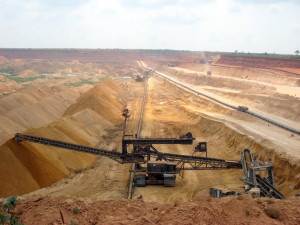Are African Economies Ready for Dipping Commodity Prices?
Financial markets this summer were tumultuous to say the least. African markets, which passed through the financial crisis relatively unscatheded, have now become a major area of concern. The collapse and ongoing slump of commodity prices has threatened to destabilize African currencies and government finances. With no end in sight to diminishing global commodity prices, many African policymakers must brace themselves for difficult times ahead and begin planning for serious economic reform.

For over a decade, Sub-Saharan Africa has been dubbed a development success story generating economic growth of nearly six percent from 2000-2010 and boasting many of the world’s fastest growing economies. However, growth had largely been underpinned by rising commodity prices. This demand was primarily fueled by China’s economic engine.
The slowing of the Chinese economy and oversupply of producers have caused a widespread decline in commodity prices since the second half of last year. Iron ore, oil, and coal are now trading at less than half their 2011-value.The devaluation of the yuan in August and reports of slowing economic figures indicate that Chinese demand for commodities may only continue to decline in the coming months. As a result, African currencies have plummeted in value: the South African rand and Zambian kwacha have already hit all-time lows.
The commodity slump poses serious threats to the finances of many African governments. The allure of growth formerly compelled investors to buy large amounts of dollar-denominated African government bonds to support infrastructure projects. The fall in commodity prices has emptied state coffers due to collapsing commodity export earnings, lowering their ability to pay off debt; moreover, the depreciation of African currencies will make bonds even more expensive to repay. Bond yields have soared as a result, posing the risk of debt downgrades that can scare away investment.
African governments have largely failed to use the commodity boom to diversify their economies. Even though exports from Sub-Saharan Africa have quadrupled since 2011, manufacturing has only made up 13% of this growth, making the region particularly vulnerable to the recent slump.The coming months will be a reality check for many African leaders who have become complacent in assuming the commodity boom would last forever. They will have to make tough choices, but certain actions would be a step forward: un-pegging their currencies, restructuring their debt, and cutting excess spending are a start. Until drastic changes are made, volatility will continue to be an obstacle for growth.
